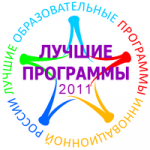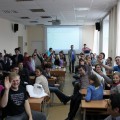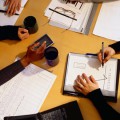NewsThe student’s school of social and legal knowledge in correctional facilities of Krasnoyarsky kray.
It is not the first time when the students of our institute visit schools at correctional facilities №27 and №31. Students conduct social lessons with prisoners there in the framework of the project "the school of social legal knowledge". Spanish Education. View from the inside.
There is a belief in Russia that all the foreign things are better by definition. Is that true? I've already discussed the way I got to the University of Cadiz (Spain). Now I want to tell you about the inside features of education in Europe. I will start from the beginning. I found out the first difference while being in Russia. The fact is that our educational program is scheduled in advance and we cannot change it. In Europe the students choose the classes they are interested in themselves. They also choose the number of classes. Of course, there is a minimum number of credits. As for the maximum number, they are limited only by the physical abilities of the student. If you have a desire, you can study all around the clock. The cost, by the way, is also made up of the number of credits. Furthermore, I would like to pay your attention to the teaching methods. There are no lectures and tutorials which are so usual for us. Each class is an open discussion on a particular topic. There is a debate and by the debate I mean a highly controversial discussion. Every student is eager to express his/her view. The Spaniards, thanks to their natural temperament, make it impressively. One more feature is the Virtual Campus, where you can find all the course materials, can send homework to the professor or just get advice from them. In general, the campus is the main artery of the university life. From my point of view, the main thing that makes difference between our University and the one in Cardis is the location. According to Wikipedia, it is located in the oldest European town just on the Atlantic shore. That gives an incredible view out of the campus’ windows. Greenery and palms are everywhere as well as happy and laid-back Spaniards. It’s a piece of cake for them to dance flamenco right in the queue. Surrounding peacefulness and glow of the city undoubtedly make an impression on you. In no longer than two weeks you notice to your surprise, that you’re walking down the street with a faint smile and pleasurable thoughts in your head, not with the… feeling of the heap of troubles on your shoulders. Honestly, Spaniards are not that sort of people who like working or studying. They only wait for a reason to arrange a holiday or to go on a strike. Needless to say, they can make excellent parties. The famous Cardis carnival is well comparable in scope to Rio carnival. All in all, education in Spain, as well as in any other partner university of SFU, will be unforgettable, and the experience gained – priceless. The second “What? Where? When?” quiz tournament in the Law Institute
Whatever is said, the general truth is that the most exciting battles are neither on fists, nor verbal ones. The most fierce and sophisticated battles are those which take place between human minds. The field of “brain ring” is an infinite battleground; because human’s thoughts have no limits to be restricted. 27th , September 2013 a traditional quiz competition “What? Where? When?” has been held between the freshmen students of the Law Institute. It was one of the competitions in the framework of “The OLympIad”. It was the second tournament, 12 teams have participated. All in all around 70 students have taken part in the competition.
Each student has proved their erudition and the knowledge of different historical events. For example, who knows what The Boston Tea Party is? I do. Well, I’m not boasting now. The thing is that 16th December 1773 they decided to organize a tea drinking flashmob in Boston. And then it started. There were many different funny moments as well. For instance, from the point of view of some participants, the captain of a sailing ship, having decided to fight to the end, ordered to nail him to the mast! And Yuriy Stoyanov, the actor, while simulating his illness, heard from his mother the famous Stanislavskiy’s saying “Uzbagoysya!” (“calm down” in a sarcastic form) Sometimes you could hear claims of unfair points or moaning on the absurdity of the questions. However, the tasks were challenging but manageable and this kind of reaction might be down to excitement. By the end of the second tour one of the teams unexpectedly found themselves on the second place. In the third tour, as well as throughout the whole competition, the team called “The Right Meaning” was on the lead. Cheering "CLD!" (stands for Comparative Law Department – the name of the team’s group) out loud after each correct answer, they beated all the competitors. They certainly deserved to win in this fair “fight”, and I am happy to congratulate my group mates with it. The team “The PobYudIteli " came in second place being just slightly behind. “Katiny Nyashki”, named after their second-year students’ curator, took the third place. The club of intellectual games always welcomes students and teachers. The forthcoming activities of the club will take place in a foreseeable future. First place – “The Right Meaning”
Second place - “PobYudItely”
Third place - “Katiny Nyashki”
Vasilyj Zobnin, SFU law institute press centre
Days of the European Culture at SFU Law Institute
Do you know that the criminal process in Russia and Germany differs significantly? Do you know that German students study for 6.5 years, pass two state exams and only then are given the right to call themselves “lawyers”? And you probably do not know what Germans say about our city, and which stereotypes about Siberia they have. Students were able to hear all these and much more when visiting lectures during the Days of the European Culture. A.D. Nazarov – the head of the Criminal process Department at the Law Institute was telling the undergraduates about the specific features of the criminal process in Germany and was comparing it to the Russian process. There is no jury in Germany, no public investigators and no death penalty, but there are juvenile prisons. All these distinguish such similar systems. Senior student of the Comparative Law Department Hermann Jacobi continued the lecture. On himself he had experienced the pros and cons of the legal education in Germany. Therefore, he had learned the features of the German system of education directly. ‘Having received 13 points out of 18 for the exam, you feel yourself like a God of German jurisprudence’ – Herman was laughing, thus, emphasizing the complexity of learning. The new exchange students from Germany confirmed his words. On the lecture they have also told about the stereotypes they have in their home country about Russian mentality and Russian culture as a whole. Russian students could not help but laugh when German students started talking about matryoshkas, bears and valenkis. Our foreign colleagues willingly answered numerous students' questions about the German culture. In general, it appeared to be a pleasant communication between the two different cultures. Simultaneously, Ph.D. Mitskevich was holding a review lecture in a different audience on the prospects of teaching comparative law, legal origins of the partnership between the universities of the two countries. The formal part of the day was concluded with the lectures of the 3rd and 4th-year students of the International Relations Department . Evgeniy Sabirov ,the 4th year student told about the model UN project, what the madel group does and what can be inferred from it’s activities. Ksenia Denisova and Kristina Werner, the 3rd year students, have recently returned from the UK and Germany, and were eager to describe the perspectives of studying abroad. After discussing the ins and outs, girls came to the conclusion that studying abroad is not only prestigious and qualitative, but also more than available for students of SFU. Catherine Karepova, our graduate, had accepted the proposal of the organizers to talk about the Czech Republic with pleasure. Jaroslava Kozyreva, a graduate of Krasnoyarski State Pedagogical University, was in Poland a couple of months ago, so she was talking about her trainings at the University there. Yuriy Reznikov, a senior year student of the Comparative Law Department had successfully passed the exams in Passau and willingly shared his formula of success with the students. For two days Yuriy was lecturing about legal education in Germany. He also conducted several practical trainings. Thus, the first day of the event ‘Days of the European culture’ was successful. The students met with older students, have opened up new directions in their specialties. Most importantly they have understood that studying European culture with pleasure is possible. The second day of the event was no less interesting. Particular attention should be paid to the report of Christopher Deininger, the lecturer from German Academic Exchange Service (DAAD) -the student fellowship program. Professor Deininger has been living in Russia since 1998. ‘I got a degree in Slavic linguistics. One day I just took a willful decision - go to Russia for two or three years, then come back. And then ... I fell in love, got married, now I have children’- Prof. Deininger says. It’s necessary to say about professor’s report in details. So, DAAD ( Deutscher Akademischer Austauschdienst) is a self-govering system which includes 230 German Universities with representation in the majority of the countries. What is the aim of this organisation? 1) support of German language and culture abroad 2)internalization of German universities 3) advice on studying and conducting a scientific research in Germany 4) development of international science and education For 90 years there has been a continuous growth of foreign students from Russia. Today, there are more than 10000 our students in Germany and 4000 of them are students of DAAD program. DAAD gives opportunities to students, graduate students and scientists for participation in educational and research programs . There are summer language courses available, as well as several possibilities to participate in half-year and 1 year studying programs at the Universities of Germany. In order to take part in such programs you should: 1) click on www.daad.ru or www.daad.de 2)choose 3 programs which are interesting for you 3)write an essay ( a letter of motivation). Do not use such phrases as :‘I love Germany and that’s why I want to study here’. No. First of all, you should write about the advantages of getting education in Germany and what are your anticipations. Finally, write about the importance of the foreign language in your future. 4) confirm your knowledge of German. You can pass the DSD exam in Krasnoyarsk or pass the test OnDaff on www.ondaf.de . The application deadline is 25.10.2013. If you have any questions, you can use SFU’s site or contact the lecturer from DAAD or click on www.daad.ru or www.daad.de. It is impossible not to mention the speech of the candidate of law, Professor L. Mickevich. At the time organizers had suggested her presenting the report she was about visit Germany. A week later she was telling Russian students about some aspects of administrative law in Russia and Germany. Paggy Lose is the tutor for students who are studying with DSG program. In her report she was telling the students about the cultural integration between Russia and Germany. The distinctive feature of the Days of the European culture was an opportunity to combine different opinions and points of view. So, Alexandra Dvorinovich, the vice-chairman of SFU, has also prepared the report. She noticed the high role of the student unions in students’ life. Student press service of our university has been cooperating with the student union of SFU for a long time, so more events of the kind are required. Alexandra has also told about her personal experience - she has been in Australia with the program of students’ exchange. It’s necessary to develop yourself. Daria Druzhinina has just come back from the USA where she was studying for a year. Moreover, she was engaged in scientific and social activities. Our student was the head of the human rights organization abroad. She has also managed to take part in the UN session and summer schools on European law. Thanks to such students our University gets famous around the world. Friday, September 27th Svetlana Skorostinskaya, the head of the Press service at the Youth Government, conducted the meeting with the students. She mentioned the importance of being active in the student life and encouraged everybody to enroll the Youth Government. Oleg Yanov (the graduate student) has told the students about his international scientific experience. Days of the European culture were ended with the presentation of a German film named ‘the Russian party’. In conclusion, we would like to stress that such events are very important for students. In the world of unlimited opportunities young people are thinking more about the foreign education. And we need to conduct such events in order to eliminate all the fears and doubts of students. Associate Professor A. Vasilieva - the laureate of the German-Russian Law Award 2013.
As a research in Russian language, the expert committee selected the work by Anna Vasilyeva (the Associate Professor of Constitutional, Administrative and Municipal Law) titled "Service state: legal research of the public services provisions in Germany and Russia". The article was published by the publishing house of the Russian Academy of Sciences in the series “Young Scientists’ works" in 2012. September, 19 2013 Professor Trunk and Professor Wedd solemnly handed the certificates and special prizes for the winners at the Annual Conference of the German-Russian Law Institute in Passau. More Articles... |





